The brain that changed a sport
As the dust settles in San Francisco on Super Bowl 50, the sport of American Football has been thrown into the spotlight again - but for the wrong reasons.
The Hollywood film Concussion, starring Will Smith, is the story of Dr Bennet Omalu.
Growing up in Nigeria, Dr Omalu wasn't a fan of American football. He didn't watch the game, he didn't play the game.Yet what he discovered rocked the sport.
The name Mike Webster meant nothing to Dr Omalu until 2002. One of the biggest names in NFL, the Pittsburgh Steeler was the best centre in the game, a four-time Super Bowl winner.
When he died suddenly of a heart attack at the age of 50, Dr Omalu was assigned to do the autopsy. He found that Webster's brain didn't look the way it should.
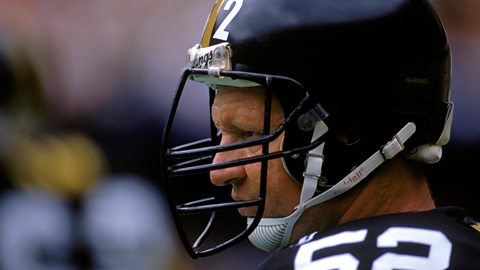
"I wouldn't let my son play football"
Dr Bennet Omalu discusses his initial concerns about Mike Webster's brain.
Omaru found that Webster had been suffering from a disease which is now known as Chronic Traumatic Encephalopathy or CTE. It was the first evidence that playing American football, a sport where big collisions were the norm, could cause brain damage.
In the film we use the illustration of an onion inside of a jar, you cannot stop the onion from (being) hit. That's the human brainActor Will Smith: Concussion
Webster probably wasn't the first to live with CTE. He almost certainly isn't the last. In the build-up to Super Bowl 50, news emerged that former Oakland Raiders quarterback Ken Stabler had the brain disease. Like other sufferers of CTE, he was only diagnosed after his death.
Dr Omalu says CTE is a major issue for many sports, not just American football. It can be a problem for boxing, ice hockey, mixed martial arts and rugby.
"When you expose your head to long force trauma with or without a helmet, with or without symptoms, there is a significant risk of permanent brain damage 40 years later," he said.
Dr Omalu says that when he examined Webster's brain, he noticed "abnormal accumulations of protein" that did not resemble any known dementia.
"I had to show it to other doctors who confirmed my findings," he recalled.
"Unfortunately, when I identified CTE, I thought it was something good, useful, beneficial. Low and behold, the response to me was very negative. I stood firm with my fate and this time I felt the players and their families would be vindicated, like they are vindicated today."

"The helmet presents a greater problem"
Will Smith discusses his new film and the physical cost of being an American footballer
Webster, known as Iron Mike, won four Super Bowl rings with the Pittsburgh Steelers and was inducted in to the NFL Hall of Fame. But the years of being repeatedly hit on the field took a brutal toll. He couldn't remember the simplest things, sometimes sleeping in his car by the side of the road because he didn't know how to get home.
We are encouraging players to see it, as a teaching tool for them about the not-so-ancient history of how the league mismanaged a serious health and safety issue, and why it’s crucial for the union to be aggressive on these issues.George Atallah, NFL Players Association
Now his story is being told on cinema screens around the world - and Dr Omaru is full of praise with the way Smith portrayed him: "He did a wonderful job."
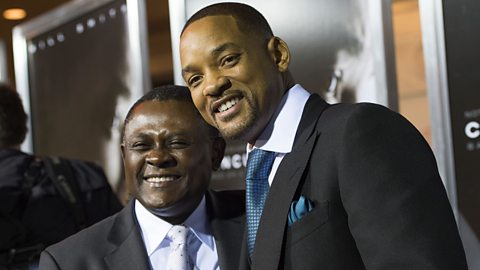
"My mother believed Will Smith was her son"
Actor Will Smith plays Nigeria-born forensic pathologist Dr Bennet Omalu in Concussion.
NFL commissioner Roger Goodell hasn't watched the film but insists player safety is his "number one priority":
"We've changed our rules, we've changed our equipment," he said. "We've made the game safer by taking the unnecessary risks out of the game. We've made 39 rule changes to make our game safer. Our former players, according to our government studies, are living three years longer than you or I as an average male."
But the issue of concussion and CTE remains a hot topic.
George Atallah, from the NFL's Players Association, says the film is a good way of educating current players:
"I think that's where the film has a really strong message," he said. "Not that football is dangerous, because we all know playing football comes with risks, but the only way football is going to end is if we continue to deny some of the dangers and don't try to fix them."
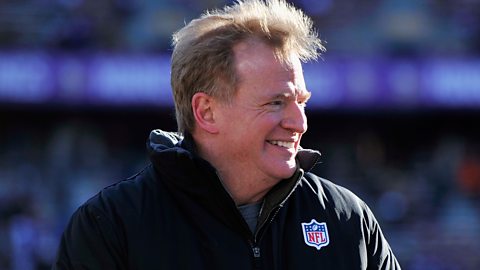
"We've made 39 rule changes to make our game safer"
NFL commissioner Roger Goodell says "the conversation is a positive thing"
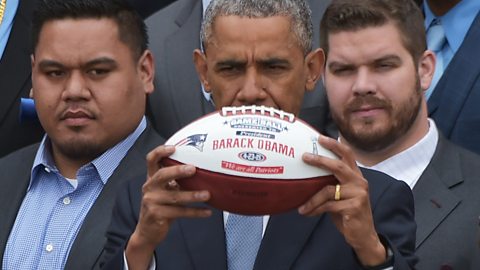
"I don't know what you do if a guy like that hits you"
US president Barack Obama says "part of the problem is the speed and the size" of players
For many, playing American Football for a living is a childhood dream. For most, the risks are worth taking.
"My job was to deliver the most punishing blow I could deliver, legally," said Shawne Merriman. "Sometimes that results in injury and getting hurt, but it wouldn't stop me from doing it all over again."
Merriman was one of the top linebackers in the NFL during his eight-year career with the San Diego Chargers and the Buffalo Bills.
He earned the nickname "Lights Out" because of the high number of "sacks" or tackles he made.
"There'll be some changes, but ultimately the game of football is so loved here in the US that it's always going to be around," he said, adding that the risks are never going to be completely eliminated.
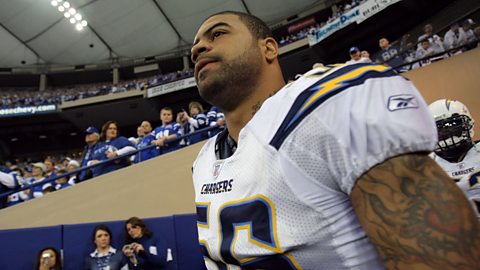
"I think all of our minds are trained to be gladiators"
Ex-NFL player Shawn Merriman says the object of the game is “to be aggressive”
